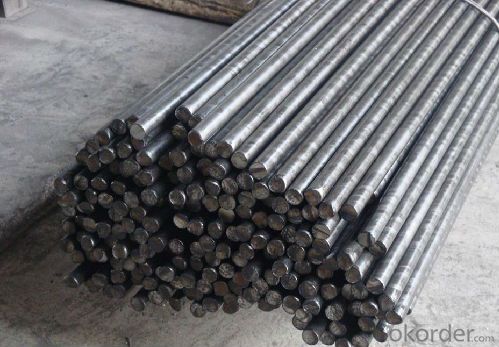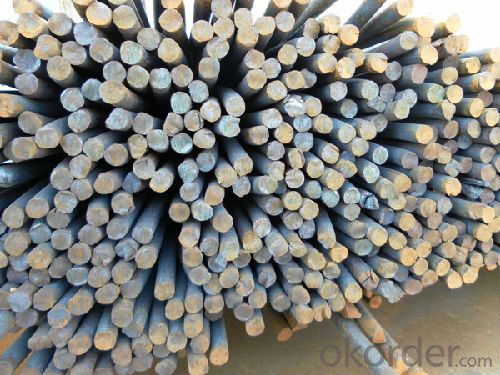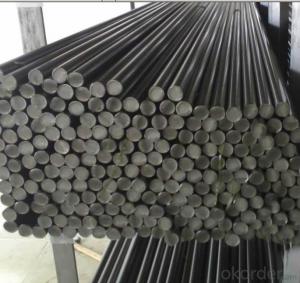High Quality Spring Steel Round Bar 12-16mm
- Loading Port:
- China main port
- Payment Terms:
- TT or LC
- Min Order Qty:
- 100 m.t
- Supply Capability:
- 10000 m.t/month
OKorder Service Pledge
OKorder Financial Service
You Might Also Like
High Quality Spring Steel Round Bar 12-16mm
Product Description:
Spring Steel can be divided into two types. One is carbon spring steel, and other one is alloy spring steel.
Alloy spring steel is based on carbon spring steel, by adding one or more alloying elements to improve the mechanical properties, hardenability and other properties to meet the requirement for manufacture all kinds of spring steel.
Specification of High Quality Spring Steel Round Bar 12-16mm:
-Material: 1065
-Standard: ASTM
-Production: Hot rolled or cold rolled
-Type: Spring Steel
| Diameter(mm) | Mass(kg/m) | Section(mm2) |
| 12 | 0.888 | 113.04 |
| 15 | 1.39 | 176.625 |
| 16 | 1.58 | 200.96 |
Corresponding Steel Grade of High Quality Spring Steel Round Bar 12-16mm for Reference:
USA, ASTM | CHN, GB/T | JPN, JIS | ISO |
1065 | 65 | SWRH67A SWRH67B | Type SC Type DC |
FRA, NF | GBR, BS | ||
C66D | C66D |
Chemical Composition of High Quality Spring Steel Round Bar 12-16mm:
C | Mn | Ni | Si |
0.62~0.70 | 0.50~0.80 | ≤0.30 | 0.17~0.37 |
P | S | Cr | Cu |
≤0.035 | ≤0.035 | ≤0.25 | ≤0.25 |
Mechanical Properties of High Quality Spring Steel Round Bar 12-16mm:
-Tensile Strength σb (MPa): ≥695
-Yield Strength σs (MPa): ≥410
-Elongation δ10(%): ≥10
-Percentage reduction of area: ψ (%): ≥30
-Hardness HBS, no heat treatment: ≤255
Usage/Applications of High Quality Spring Steel Round Bar 12-16mm:
-ASTM1065, is medium-high carbon spring steel. After heat treatment, this type of steel obtains high strength, hardness and elasticity but this material isn’t perfect for welding.
-Its fatigue strength is equal to alloy spring steel when they are in same configuration.
-For manufacturing spring, spring circle, all kinds of grommet, clutch, and axels in the production of normal machine.
Packaging & Delivery of High Quality Spring Steel Round Bar 12-16mm:
-Packing Detail: The products can be packed in bundles by steel wires.
-Marks: There are two types of marks. One is color mark and other one is tag mark. We paint color marks on both ends of bundles to make sure that it’s more convenient for customers to distinguish their products from other products at the destination port. The tag marks will be tied up to each bundle to make sure that customers know the specifications of each bundle like product’s name and size and other information of products.
-Delivery Detail:
1, Delivery time: 30~60 working days after receive buyer’s T.T. or L/C.
2, Delivery status should be written in the contract. (Heat treatment or no)
FAQ:
Q1: Why buy Materials & Equipment from OKorder.com?
A1: All products offered byOKorder.com are carefully selected from China's most reliable manufacturing enterprises. Through its ISO certifications, OKorder.com adheres to the highest standards and a commitment to supply chain safety and customer satisfaction.
Q2: How do we guarantee the quality of our products?
A2: We have established an advanced quality management system which conducts strict quality tests at every step, from raw materials to the final product. At the same time, we provide extensive follow-up service assurances as required.
Q3: How soon can we receive the product after purchase?
A3: Within three days of placing an order, we will arrange production. The shipping date is dependent upon the quatity, how many sizes you want and the plan of production, but is typically 1 month to 2 month days from the beginning of production.
Images of High Quality Spring Steel Round Bar 12-16mm:


*If you would like to get our price, please inform us the size, standard/material and quantity. Thank you very much for your attention.
- Q:How is ultra-high-strength steel used in the construction industry?
- Ultra-high-strength steel is used in the construction industry for various applications. It is commonly used in the construction of high-rise buildings, bridges, and other structures that require high load-bearing capacity and resistance to extreme conditions. The unique properties of ultra-high-strength steel, including its exceptional strength and durability, allow for the creation of lighter and more efficient structures. This steel is often used in critical components such as beams, columns, and trusses, enabling the construction of taller and more complex structures with enhanced safety and longevity.
- Q:What are the specific requirements for special steel used in the railway wheel industry?
- The specific requirements for special steel used in the railway wheel industry include high strength, durability, and resistance to wear and fatigue. The steel must have excellent mechanical properties to withstand heavy loads and impact forces. It should also have good heat treatment characteristics to ensure proper hardness and toughness. Additionally, the steel must meet strict dimensional and geometrical specifications to ensure compatibility with the railway system.
- Q:What is the chemical composition of special steel?
- Special steel encompasses a wide range of steel alloys that possess specific properties and characteristics. The chemical makeup of special steel can differ depending on the particular grade or type of steel being discussed. Nevertheless, special steel typically contains greater amounts of alloying elements compared to regular carbon steel. These alloying elements may consist of chromium, nickel, molybdenum, vanadium, tungsten, and others. The specific combination and proportion of these alloying elements determine the distinctive properties of special steel, such as increased strength, enhanced resistance to corrosion, improved ability to withstand high temperatures, or better resistance to wear and tear. To illustrate, some common variations of special steel include stainless steel, which generally consists of high levels of chromium and nickel, resulting in excellent corrosion resistance; tool steel, which contains high carbon content and often includes additional elements like vanadium or tungsten, making it suitable for cutting, drilling, or shaping tools; and high-speed steel, which incorporates elements such as molybdenum, cobalt, or tungsten, providing exceptional hardness and heat resistance, ideal for use in cutting tools or drills. To summarize, the chemical composition of special steel varies based on the specific type or grade, but it typically involves elevated levels of alloying elements to achieve desired properties such as strength, corrosion resistance, heat resistance, or wear resistance.
- Q:How does bearing steel resist fatigue?
- Bearing steel resists fatigue due to its high strength, hardness, and excellent resistance to wear and impact. It is specifically designed to withstand repeated loading and stress cycles without undergoing deformation or failure. Additionally, the steel's microstructure is carefully engineered to enhance its resistance to fatigue by distributing stress evenly and minimizing the formation of cracks or fractures.
- Q:What are the different non-metallic inclusions in special steel?
- There are several types of non-metallic inclusions that can be found in special steel. These inclusions are usually formed during the steelmaking process and can have a significant impact on the properties and performance of the steel. One common type of non-metallic inclusion is oxide inclusions. These inclusions are typically formed by the reaction of oxygen with elements present in the steel, such as silicon, manganese, and aluminum. Oxide inclusions can have a detrimental effect on the steel's mechanical properties, such as reducing its toughness and ductility. Another type of non-metallic inclusion is sulfide inclusions. These inclusions are formed by the reaction of sulfur with elements like manganese and iron. Sulfide inclusions can also have a negative impact on the steel's mechanical properties, as they can act as stress concentration sites and promote the initiation of cracks. Nitride inclusions are another type of non-metallic inclusion that can be found in special steel. These inclusions are formed by the reaction of nitrogen with elements like aluminum and titanium. Nitride inclusions can have a positive effect on the steel's properties, as they can improve its strength and hardness. Other types of non-metallic inclusions that can be present in special steel include carbide inclusions, which are formed by the reaction of carbon with elements like iron and chromium, and silicate inclusions, which are formed by the reaction of silica with elements like calcium and aluminum. Overall, the presence and characteristics of non-metallic inclusions in special steel can greatly influence its performance and suitability for specific applications. Therefore, it is important for steel manufacturers to carefully control and minimize the formation of these inclusions in order to produce high-quality steel with desired properties.
- Q:What are the specific requirements for special steel used in the nuclear industry?
- The specific requirements for special steel used in the nuclear industry include high strength and toughness, excellent corrosion resistance, low susceptibility to stress corrosion cracking, and resistance to radiation damage. These steels must also have good weldability and the ability to maintain their mechanical properties under extreme conditions, such as high temperatures and pressures. Additionally, they need to meet strict quality control standards and undergo rigorous testing and certification procedures to ensure their suitability for use in nuclear power plants.
- Q:What are the safety considerations when working with special steel?
- When working with special steel, there are several important safety considerations to keep in mind. Firstly, it is crucial to wear appropriate personal protective equipment (PPE) such as safety glasses, gloves, and protective clothing to prevent any potential injury. Special steel may have sharp edges or contain hazardous materials, so precautions should be taken to avoid cuts or exposure to harmful substances. Additionally, special steel may require specific handling techniques due to its weight or complexity. It is important to follow proper lifting and handling procedures to prevent strains or accidents. Furthermore, working with special steel often involves the use of heavy machinery or tools, so operators must be trained and qualified to operate such equipment safely. Another safety consideration is the potential for fire or explosion. Depending on the type of special steel, it may have specific flammability properties, and appropriate fire prevention measures should be implemented. This includes having fire extinguishers readily available and ensuring a safe working environment free from any potential ignition sources. Lastly, proper ventilation is crucial when working with special steel, as certain processes may release harmful fumes or gases. Adequate airflow and ventilation systems should be in place to minimize the risk of respiratory issues or chemical exposure. By considering these safety measures, workers can mitigate potential hazards and create a safer working environment when dealing with special steel.
- Q:Can special steel be used in the manufacturing of precision instruments?
- Indeed, precision instruments can benefit from the utilization of special steel. Special steel encompasses a range of steel types that have been purposefully crafted and processed to possess specific attributes, such as heightened strength, hardness, resistance to corrosion, and thermal stability. These unique qualities render special steel highly suitable for applications necessitating precision and accuracy, such as precision instrument manufacturing. Precision instruments, such as surgical tools, measuring devices, optical instruments, and scientific equipment, necessitate materials capable of retaining dimensional stability and enduring extreme conditions. Special steels, such as stainless steel, tool steel, and high-speed steel, provide exceptional mechanical properties, including remarkable tensile strength, resistance to wear, and dimensional stability. Consequently, these kinds of steel are well-suited for the production of precision instruments. Moreover, special steel can be engineered to possess specific characteristics, such as low magnetic permeability or excellent resistance to temperature fluctuations. These attributes prove particularly vital in precision instruments, as magnetic interference or temperature variations have the potential to impact their performance. To summarize, special steel can indeed be employed in the manufacturing of precision instruments due to its exceptional mechanical properties, dimensional stability, and ability to withstand harsh conditions. Its versatility enables the production of precision instruments of superior quality, fulfilling the stringent requirements of various industries, including the medical, scientific, and engineering sectors.
- Q:How does special steel perform in high-pressure hydrogen environments?
- Special steel performs well in high-pressure hydrogen environments due to its high strength, corrosion resistance, and ability to withstand hydrogen embrittlement. It offers reliable performance and minimizes the risk of hydrogen-induced failures, making it a suitable choice for applications such as hydrogen storage, transportation, and fuel cells.
- Q:What are the main applications of special steel in the marine sector?
- Special steel is widely used in the marine sector for various applications. Some of the main applications include shipbuilding, offshore oil and gas exploration, and marine equipment manufacturing. Special steel is used to construct the hulls and superstructures of ships, as well as various components such as propellers, shafts, and rudders. Its high strength, durability, and corrosion resistance make it ideal for withstanding the harsh conditions of the marine environment. Additionally, special steel is also used in the construction of offshore platforms, pipelines, and underwater structures, as it can withstand extreme pressures and resist corrosion caused by saltwater.
1. Manufacturer Overview |
|
|---|---|
| Location | |
| Year Established | |
| Annual Output Value | |
| Main Markets | |
| Company Certifications | |
2. Manufacturer Certificates |
|
|---|---|
| a) Certification Name | |
| Range | |
| Reference | |
| Validity Period | |
3. Manufacturer Capability |
|
|---|---|
| a)Trade Capacity | |
| Nearest Port | |
| Export Percentage | |
| No.of Employees in Trade Department | |
| Language Spoken: | |
| b)Factory Information | |
| Factory Size: | |
| No. of Production Lines | |
| Contract Manufacturing | |
| Product Price Range | |
Send your message to us
High Quality Spring Steel Round Bar 12-16mm
- Loading Port:
- China main port
- Payment Terms:
- TT or LC
- Min Order Qty:
- 100 m.t
- Supply Capability:
- 10000 m.t/month
OKorder Service Pledge
OKorder Financial Service
Similar products
New products
Hot products
Related keywords






























